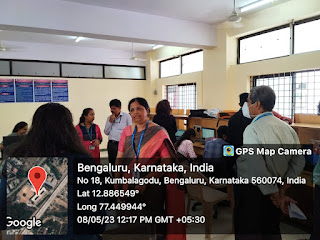A Comprehensive Guide for Engineering Students Preparing for Their Careers | engineering college in bangalore
A
Comprehensive Guide for Engineering Students Preparing for Their Careers
Embarking on a career in
engineering is an exciting journey filled with opportunities and challenges. As
you navigate this path, it's crucial to equip yourself with the right tools and
strategies for success. In this comprehensive guide, we will delve into
valuable tips and advice for engineering students preparing for their careers,
covering essential aspects such as networking, resume building, and interview
skills.
Engineering
Career And What It Entails?
An engineering career involves
the application of scientific and mathematical principles to design, innovate,
and create solutions for real-world challenges. Engineers develop, analyse, and
implement solutions in various fields, including civil, mechanical, electrical,
and aerospace engineering. They work on diverse projects, ranging from
infrastructure development and sustainable energy solutions to advanced
technologies and space exploration.
The role of an engineer extends
beyond technical expertise, requiring effective communication, problem-solving,
and collaboration with multidisciplinary teams. Engineers play a pivotal role
in shaping the future by designing efficient systems, improving existing
processes, and contributing to technological advancements. The profession
demands continuous learning and adaptability to stay abreast of evolving
technologies and industry trends. An engineering career offers the opportunity
to make a tangible impact on society, driving progress and addressing global
challenges through innovation and creativity.
Networking:
Building Bridges to Your Future
Networking is a cornerstone of
career development, offering a bridge between academia and the professional
world. Here's how you can effectively navigate this crucial aspect of career
preparation:
●
Embrace Industry Events: Attending conferences, workshops, and seminars within your
engineering domain exposes you to the latest trends and provides opportunities
to connect with professionals. Actively participate in networking sessions,
where you can exchange ideas and make meaningful connections.
●
Membership in Professional Organizations: Joining engineering associations or societies relevant
to your field provides a platform to stay updated on industry developments.
Attend local chapter events to meet professionals in your area, share insights,
and gain exposure to potential mentors.
●
LinkedIn Optimization:
Crafting a compelling LinkedIn profile is a digital key to the professional
world. Ensure your profile is complete, highlighting academic achievements,
projects, and aspirations. Connect with professors, classmates, and
professionals, and engage in relevant conversations to expand your network.
●
Informational Interviews: Proactively reach out to professionals for
informational interviews. These one-on-one discussions offer invaluable
insights into different career paths, industry trends, and essential skills. Be
prepared to ask thoughtful questions and showcase your genuine interest in
their experiences.
●
Career Fairs:
Attend career fairs organised by your college or in your local area. These
events provide a direct interface with recruiters and industry professionals.
Bring multiple copies of your tailored resume and be ready to articulate your
skills and career goals confidently.
Resume
Building: Crafting Your Professional Identity
Your resume is your marketing
tool, showcasing your skills, experiences, and potential contributions. Here
are key strategies to build a compelling engineering resume:
●
Tailoring for Each Application: Customise your resume for each job application. Highlight
experiences, skills, and achievements that align with the specific requirements
of the position. Tailoring your resume demonstrates a genuine interest in the
role.
●
Quantifying Achievements: Use quantifiable metrics to highlight the impact of
your projects or contributions. Whether it's reducing costs, improving
efficiency, or increasing productivity, numerical achievements make your resume
stand out and demonstrate tangible results.
●
Skills Section:
Devote a dedicated section to your technical and soft skills. List relevant
programming languages, software proficiency, and any certifications you have
acquired. This section serves as a quick reference for recruiters looking for
specific qualifications.
●
Project Descriptions:
When detailing your projects, provide concise yet comprehensive descriptions.
Clearly articulate your role, responsibilities, and the technologies or
methodologies employed. Showcase your problem-solving abilities and the
practical application of your engineering skills.
●
Professional Summary:
Craft a compelling professional summary that succinctly captures your career
objectives and what you bring to the table. Use this section to convey your
passion for engineering, your key strengths, and your commitment to
professional growth.
Interview
Skills: Making a Lasting Impression
The interview is your
opportunity to shine, demonstrating not only your technical competence but also
your interpersonal skills. Here's how to prepare effectively:
●
Research the Company:
Before the interview, have a thorough knowledge of the company. Understand its
mission, values, recent projects, and any challenges it may be facing. This
knowledge demonstrates your genuine interest and preparedness.
●
Review Common Interview Questions: Familiarise yourself with common engineering interview
questions. Practise your responses, emphasising your experiences,
problem-solving abilities, and teamwork skills. Be ready to provide specific
examples from your academic and extracurricular activities.
●
Behavioural Interviews:
Many engineering interviews include behavioural questions to assess how you've
handled past situations. Use the STAR method (Situation, Task, Action, Result)
to structure your responses, providing a clear and compelling narrative of your
experiences.
●
Technical Proficiency:
Brush up on your technical skills relevant to the position. Be prepared to
solve problems on a whiteboard or discuss technical challenges. Confidence in
your technical abilities enhances your credibility as a candidate.
●
Soft Skills Matter:
While technical skills are crucial, employers also value soft skills such as
communication, teamwork, and adaptability. Provide examples of how you've
effectively collaborated on projects, communicated complex ideas, and adapted
to challenges.
●
Ask Informed Questions:
Toward the end of the interview, when given the opportunity, ask thoughtful
questions. Inquire about the team dynamics, ongoing projects, or the company's
future goals. This demonstrates your genuine interest in the role and the
organisation.
Conclusion
In the dynamic and competitive
field of engineering, we at RRCE believe that
success is not solely determined by academic achievements but also by your
ability to navigate the professional landscape. By actively engaging in
networking, crafting an impactful resume, and honing your interview skills, you
position yourself as a strong candidate ready to contribute to the exciting
world of engineering. Remember, your journey is unique, and each step you take
is a valuable learning experience that propels you closer to the fulfilling
career you envision. Visit us at RajaRajeswari College of Engineering for more
informative blogs.




Comments
Post a Comment